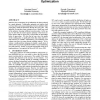Free Online Productivity Tools
i2Speak
i2Symbol
i2OCR
iTex2Img
iWeb2Print
iWeb2Shot
i2Type
iPdf2Split
iPdf2Merge
i2Bopomofo
i2Arabic
i2Style
i2Image
i2PDF
iLatex2Rtf
Sci2ools
SIGMOD
2002
ACM
2002
ACM
Exploiting statistics on query expressions for optimization
Statistics play an important role in influencing the plans produced by a query optimizer. Traditionally, optimizers use statistics built over base tables and assume independence between attributes while propagating statistical information through the query plan. This approach can introduce large estimation errors, which may result in the optimizer choosing inefficient execution plans. In this paper, we show how to extend a generic optimizer so that it also exploits statistics built on expressions corresponding to intermediate nodes of query plans. We show that in some cases, the quality of the resulting plans is significantly better than when only basetable statistics are available. Unfortunately, even moderately-sized schemas may have too many relevant candidate statistics. We introduce a workload-driven technique to identify a small subset of statistics that can provide significant benefits over just maintaining base-table statistics. Finally, we present experimental results on an i...
Database | Inefficient Execution Plans | Query Optimizer | Relevant Candidate Statistics | SIGMOD 2002 |
Related Content
| Added | 08 Dec 2009 |
| Updated | 08 Dec 2009 |
| Type | Conference |
| Year | 2002 |
| Where | SIGMOD |
| Authors | Nicolas Bruno, Surajit Chaudhuri |
Comments (0)

